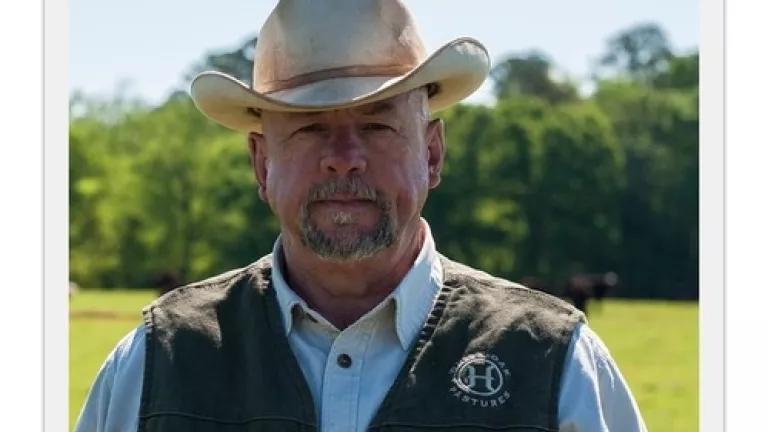
In today’s conventional meat industry, what passes for a “farm” is really more like a factory. Animals are confined indoors by the hundreds or thousands in crowded and often unsanitary conditions. Grain-feed is trucked in, while mountains of waste are trucked out. And animals are routinely fed antibiotics to help them survive and make them grow faster, a practice we know breeds antibiotic resistant bacteria that make their way into our environment and make people sick.
But farmers and ranchers across the country show us every day that there is a better way to raise the chickens, pigs and cows that end up on our plates. So it’s really a pleasure when every year we get to shine a spotlight on these leaders and tell their stories through NRDC's Growing Green Awards.
This year, I’m completely captivated by the voice, wisdom, and beautiful farm of our winning Sustainable Livestock Producer, Will Harris, owner of White Oak Pastures in Bluffton, Georgia.
Check out Will’s story and you’ll see what I mean:
Unlike his competitors in the conventional cattle industry, who typically rely on large amounts of antibiotics, hormones, and grain-feed to get their animals fattened and to slaughter as quickly as possible, Will transitioned away from a drug-dependent model to organic and antibiotic-free ranching. Today, Will uses rotational grazing to build soil carbon and spur plant growth, avoiding the need for giant manure lagoons or the heavy application of chemical fertilizers and pesticides to grow his pastures.
As Will says, natures abhors a monoculture. Because most conventional cattle farmers only raise cattle and not other animals, their land is frequently more stressed and their economic stability overly dependent on volatile cattle prices. But Will sends multiple species (five kinds of poultry, hogs, sheep and goats) through his fields in sequence to control weeds and insects. By making his farm more diverse, Will has broadened his product line and now capitalizes on the different synergies between plant and animal species, which naturally fertilize and aerate his soil.
The contrast between business as usual on most ranches and the way Will runs his farm is striking. But it also points a way forward that’s not only better for the environment and Will’s animals, but also good business for Will’s family and employees. Like Gabe Brown, a North Dakota cattle rancher and our 2012 Growing Green Award winner, and Russ Kremer, a 5th generation hog farmer from Missouri and our 2013 winner, Will’s farm is proof that sustainability is profitable. After converting his farm to the innovative, organic and grass-fed system we see today, White Oak Pastures now sells over $25 million each year in meat—up from $0.5 million.
He will tell you himself:
“The market demand has developed for antibiotic-free, pasture-raised meats. My own family’s experience is proof that sustainable agriculture is economically sustainable too,” said Harris, “What makes your soil and animals strong, will make your customers healthy, your employees happy, and your investments profitable.”
So congrats to Will and our three other inspirational 2014 Growing Green Awards winners! To read more about Will, his family, and the extraordinary century-and-a-half story of their farm check out Will’s terrific blog here.
